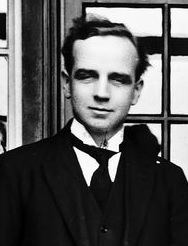Arthur Jenkins (British politician) facts for kids
Quick facts for kids
Arthur Jenkins
|
|
|---|---|
 |
|
| Parliamentary Secretary to the Ministry of Education | |
| In office 4 August 1945 – 30 October 1945 |
|
| Prime Minister | Clement Attlee |
| Preceded by | Thelma Cazalet-Keir |
| Succeeded by | David Hardman |
| Member of Parliament for Pontypool |
|
| In office 14 November 1935 – 25 April 1946 |
|
| Preceded by | Thomas Griffiths |
| Succeeded by | Daniel Granville West |
| Personal details | |
| Born | 3 February 1882 Varteg, Monmouthshire, Wales |
| Died | 25 April 1946 (aged 64) |
| Political party | Labour |
| Spouse |
Hattie Harris
(m. 1911) |
| Children | 1, Roy |
| Education | Ruskin College |
Arthur Jenkins (born 3 February 1882 – died 25 April 1946) was a Welsh coal miner and a leader in workers' rights. He was also a Labour Party politician. He served as a MP for Pontypool. He was the father of another famous politician, Roy Jenkins.
Contents
Arthur Jenkins: A Life in Politics and Mining
Early Life and Learning
Arthur Jenkins was born in Varteg, a village in Monmouthshire, Wales. When he was just 12 years old, he left school to start working in a coal mine. While working, he became very involved in helping other workers.
He went to night school to keep learning. This helped him win a special scholarship. He used it to attend Ruskin College, a college for working people. Later, he moved to the Central Labour College in London to continue his studies. He even studied for a short time in Paris at the Sorbonne.
In 1910, he returned to Wales. He went back to working as a miner. He also taught evening classes in the village of Garndiffaith.
His Family Life
On 2 October 1911, Arthur Jenkins married Hattie Harris. She worked in a music shop in Pontypool.
They had one son named Roy Harris Jenkins. Roy was born in 1920 and passed away in 2003. Like his father, Roy became a very important politician. He held big jobs in the government, like Home Secretary and Chancellor of the Exchequer. He also led the European Commission, which is like the government of Europe. Later, Roy helped create a new political party called the Social Democratic Party.
Working for Miners and in Government
Arthur Jenkins became very active in local politics. He represented the Labour Party on the Monmouthshire County Council. He strongly believed in making quick changes to improve life for workers.
During the General Strike of 1926, he was arrested. He was sent to prison for nine months. But this didn't stop him from continuing his work with the Labour Party.
Throughout the 1920s and 1930s, Jenkins worked hard for miners and the Labour movement. He was a key person for the Eastern Valleys District of the South Wales Miners' Federation. He worked there from 1921 to 1933. After that, he became the vice-president of the Federation.
In the 1935 general election, he became the Labour Party candidate for Pontypool. This was a safe seat for the Labour Party. As the world faced growing conflicts in the 1930s, his interests grew. He cared about poverty and education, not just coal miners. He also focused on world affairs.
In 1937, his ideas about preparing for war caught the attention of the Labour leader, Clement Attlee. Jenkins worked closely with Attlee as his private secretary in Parliament.
In March 1945, during World War II, he briefly worked for the Ministry of Town and Country Planning. After the war, when Clement Attlee became Prime Minister, Arthur Jenkins became a junior minister for the Ministry of Education. He had to leave the government in October 1945 due to illness. He passed away in London on 25 April 1946.
The Arthur Jenkins Indemnity Act of 1941
| Act of Parliament | |

|
|
| Long title | An Act to indemnify Arthur Jenkins, Esquire, from any penal consequence which he may have incurred by sitting or voting as a Member of the House of Commons while holding the office of Chairman of the Local Appeal Board for a Royal Ordnance Factory and to remove any disqualification for membership of that House by reason of his having held that office. |
|---|---|
| Introduced by | Winston Churchill (Commons) |
| Dates | |
| Royal assent | 10 December 1941 |
| Repealed | 18 December 1953 |
| Other legislation | |
| Repealed by | Statute Law Revision Act 1953 |
|
Status: Repealed
|
|
During World War II, Arthur Jenkins worked on special committees. These committees helped solve problems for workers at the Royal Ordnance Factory, Glascoed. This factory made weapons. Even though he was an MP, this job meant he was getting paid by the government. This was against a rule for MPs at the time.
He didn't actually take the small payment for the job. But just holding the position meant he might lose his seat in Parliament. Another MP, Sir William Davison, thought it was unfair. So, a special law was passed just for Arthur Jenkins. This law was called the Arthur Jenkins Indemnity Act of 1941. It made sure he could keep his seat in Parliament.
See Also

